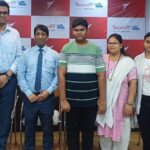- “The prevalence of Myopia in children is rapidly increasing Doctors recommend less screen time and more green time”
- As part of the Children Eye Care Week (14-20 November), LVPEI through its dedicated Children’s Eye Care and Myopia Centres organizes various awareness activities to combat Myopia
- Eye care awareness walk held to sensitise on Myopia in children
Hyderabad, November 20, 2022:
Myopia, or near sightedness, is when our eyes cannot focus light correctly and distant objects appear blurred. Some of the early signs of Myopia are – children straining or squinting the eye to see distant objects, complaining of headaches and frequent change in eye power. Children with myopia often have trouble reading the blackboard at school and will hold their books or objects very close to their face or watch TV from a very close distance. L V Prasad Eye Institute, hosted an Eye care awareness walk with the theme ‘Lets combat myopia’, to sensitise public on Myopia in children, today from L V Prasad Eye Institute, Banjara Hills. The walk was flagged off by pediatric eye patients, Dr Ramesh Kekunnaya, Head, Child Sight Institute and Dr Pavan Verkicharla, Head, Infor Myopia Centre, L V Prasad Eye Institute; graced the occasion.
The current digital ecosystem, especially the COVID-19 pandemic with the increased digital exposure for young children, more indoor-centric lifestyle, involvement in intense near work activities (for entertainment and in strive for academic excellence – excessive homework and attending coaching classes invariably held late in the evening, or before school timing for entrance exams) has robbed school children of sunlight and outdoor activities, leading to myopia. Shorter sleep duration and poor nutrition are also associated with the development of myopia. Children with a family history of myopia (either parents or grandparents with myopia) have a higher risk of developing myopia.
“Undiagnosed and untreated myopia can lead to delayed milestones in children and negatively impact their academic performance, participation in co-curricular activities and social behaviour. Children having Myopia are at a higher risk of developing retinal detachment, glaucoma, cataract and other eye diseases. Some of these eye disorders can result into irreversible vision loss,” says, Dr Ramesh Kekunnaya, Head, Child Sight Institute, L V Prasad Eye Institute.
“Myopia is a serious public health concern. If no anti-myopia measures for prevention and control are initiated, it is projected to affect approximately half of the global population (5 billion) by 2050. At current prevalence rate, 5 out of 10 children (48%) living in urban regions of India are likely to have myopia by 2050. Myopia progression is rapid in children who develop myopia at a young age. About 4% of the Indian myopes tend to have complications that can lead to permanent vision loss,” says Dr Pavan Verkicharla, Head, Infor Myopia Centre, L V Prasad Eye Institute.
L V Prasad Eye Institute is among the very few institutes in the country to have a dedicated Children’s Eye Care Centre and a dedicated Myopia Centre. LVPEI provides comprehensive and evidence-based anti-myopia treatment to prevent the onset of myopia and reduce its progression in children and young adults. This includes, environmental and lifestyle modifications, bifocal or progressive spectacle lenses, special contact lenses including Ortho-Keratology and peripheral defocus contact lenses, and medication (eye drops) as appropriate.
Controlling and Managing Myopia: Children’s health and well-being is a collective responsibility of families, teachers, doctors, healthcare organizations and government. The following safe measures will not only control the myopia progression but give better and healthier life to our children.
– Annual Eye Examination: Some children are born nearsighted, and some don’t become nearsighted until their teen years. Young children with myopia might not be able to express themselves or complain that their vision has become blurry. Hence annual eye examinations are very important in children to rule out Myopia.
– Encourage daytime outdoor activities: A great first step to prevent or slow the progression of Myopia is to encourage children to spend adequate time outdoors – natural sunlight helps protect the human eye from becoming myopic.
– Less Screen time: The amount of time the child spends using digital devices should be proportionate to the child’s age. While 12 to 16-year-olds can be allowed 8 hours of online study, the hours of screen time for younger children should be restricted to less than 4 hours. Toddlers (younger than 3 years) must be refrained from using any digital device.
– 20-20-20 rule: Every 20 minutes of watching screens or studying or doing any near-work activity, the child should take a 20 second break and look at any object 20 feet away. This will relax the ciliary muscles of the eyes and ease the strain due to prolonged near work.
– Schools: It should be mandatory for schools to have enough space for playgrounds and each day, there should be 60 minutes of recess time and at least one session of physical exercise. Annual eye screening programs for early diagnosis of eye problems in children should be organized.
– Public Awareness: Parents and teachers should be vigilant on spotting the early signs of Myopia in children and get the child’s eye examined by a trained eye specialist.
– Healthcare: Appropriate identification of myopia and referral to a trained Myopia specialist and advocating and promoting anti myopia strategies at the school and community levels.
healthysoch







